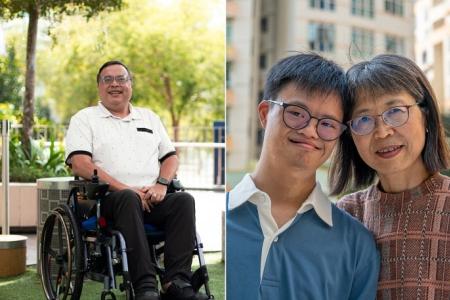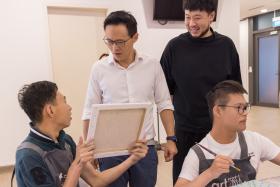People with disabilities call for a fair shot at work
On his third day as a customer service executive at an education centre, Mr Warren Sheldon Humphries was told by the branch manager to pack up and go as his bearing “traumatised” students. He has mobility issues and walked with a gait.
In his next job as a trainer at a train-and-place company during the Covid-19 pandemic, his boss did not hesitate to let him go once the work started to move offline.
Mr Humphries, 54, has Charcot-Marie-Tooth disease, which causes the progressive loss of muscle tissue and the sense of touch, and now uses a wheelchair.
While incidents like these are rare now, they illustrate plainly the persistent attitudes that prevent Singapore from reaching its goals of a disability-inclusive workforce.
On Sept 16, recommendations were announced to help 4,500 more people with disabilities in Singapore get jobs by 2030. Several task forces were set up under Singapore’s Enabling Masterplan 2030, to support those with disabilities and enable them to contribute to society.
A task force set up to promote inclusive employment laid out plans to expand employment opportunities for people with disabilities through gig work, and to better equip job coaches.
Another task force looking at community living announced that up to 250 adults with disabilities will join a pilot in the next three years, where they receive support, including care and coaching services, to live independently in the community.
Mr Humphries said he was unemployed for two years during the pandemic, and volunteered as a tour guide at an event at the Enabling Village. A man who was on his tour turned out to be the founder of travel agency Tribe Tours, and later offered him a job as a tour guide.
Today, Mr Humphries gives tours at the Enabling Village and on Sentosa.
“We broke the tourism paradigm that only able-bodied people can do this job,” he said.
He said his employer’s flexibility about his working arrangements helps, as he can conduct tours in the morning and head home to work in his other role as Tribe Tours’ community and partnerships lead. His home set-up includes a larger monitor and a keyboard with a plastic casing that helps with his hand tremors.
Mr Humphries currently has to spend time in hospital for dialysis and rehabilitation after a leg amputation, and he uses his time there to do administrative work.
He also gives talks at schools and curated tours on Sentosa for wheelchair users, in a tie-up between the company, Sentosa Development Corporation and SG Enable.
“I started as a docent, and now I’m going beyond that, planning routes and giving talks,” he said.
“If you give us the opportunity, we will surpass expectations.”
Mr Humphries said hiring people with disabilities for gig work is possible for Tribe Tours as it works with different companies, which may want to do tours on a more ad hoc basis.
Other examples of gig work opportunities cited by SG Enable include artist, mover, researcher and sign language instructor.
Ms Esther Chong, director of employment services at disability charity SPD, said that while workplaces are becoming more accessible physically, access in other areas, such as information and communication for employees with hearing loss or visual impairment, may still be lacking.
In a previous organisation, Mr Adrian Yap, who is deaf, struggled when his requests for video calls went unheeded, leaving him unable to use closed captioning to follow the discussions on phone calls.
The 45-year-old data analyst applied to work at Standard Chartered Bank in 2021 after attending its workshops on disability awareness.
“It was very different from the previous organisations I worked in, because I had never encountered such a training component that touched on disability awareness,” he said.
Now, he readily participates in video calls where he uses closed captioning, as well as in in-person meetings where he uses a transcription software.
He still faces challenges when people speak at the same time, the environment is noisy, or the transcription is inaccurate, in which case he asks his colleagues to repeat themselves or to type out the words.
To other job seekers with hearing loss, Mr Yap encourages them not to be shy about asking for accommodations to be provided for them during job interviews.
“They will be able to perform better at the interview,” he said. “If they do not have that kind of support, they will find it hard to communicate with people, and it may cause a lot of friction and misunderstanding.”
Get The New Paper on your phone with the free TNP app. Download from the Apple App Store or Google Play Store now


